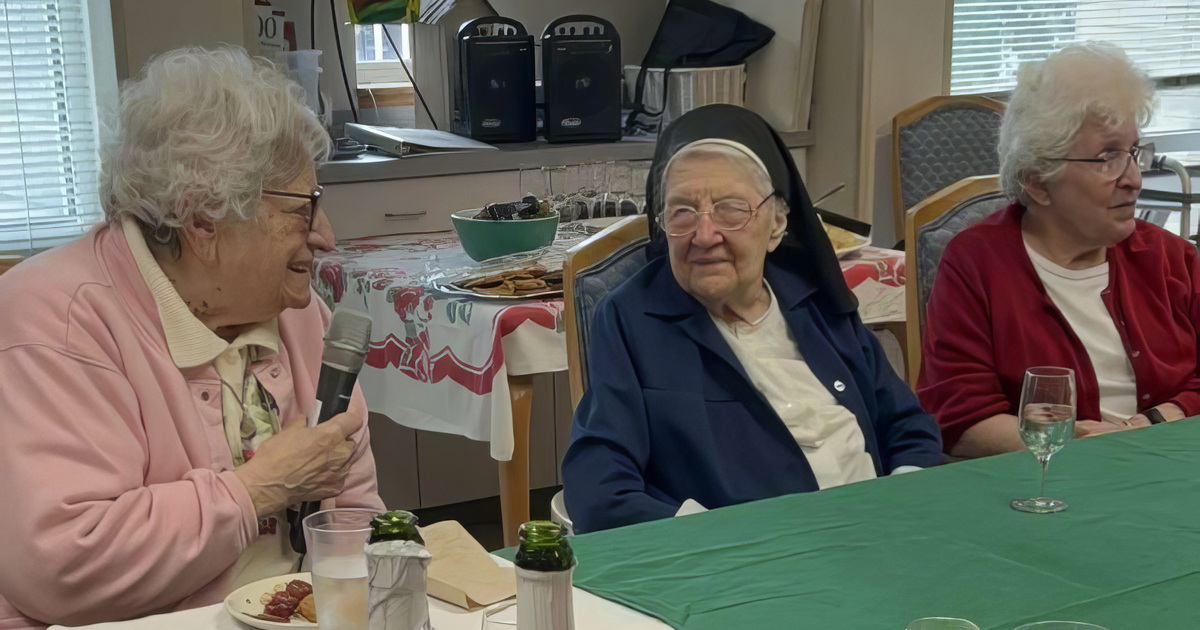How can the wisdom of the past guide us in caring for creation today? During the Season of Creation, which concluded on Friday, we are called to reflect on how we interact with the world in times of both abundance and scarcity. Recently, the Sisters of Charity of Nazareth shared stories about how they and their families practiced sustainable living and how those lessons are still relevant today.
Carolyn Cromer, Director of Ecological Sustainability, described the afternoon discussion as a way to “honor those times we all have had when money has been tight, and we have had to live more frugally.” The Sisters shared how their families navigated economic hardships, particularly during the Great Depression. While these stories emerged from difficult times, they offer us valuable lessons on creativity, resourcefulness, and community.
Sister Teresa Margaret recalled growing up on a farm during the Depression. “We didn’t suffer too much,” she said, expressing gratitude for her family’s resources. “I must say, God was good. We had cows and pigs, horses, and chickens for our eggs.” Her family made their own butter and shared their abundance with others. “The girls from the neighborhood would come to take apples from our trees,” she said. “We never complained because we had more than enough.”
When the family’s strawberry crop was plentiful, they would load baskets and distribute them along the roadside. “We never charged. We were happy to share,” Sister Teresa Margaret added. “I just thank God for all the blessings. We were very, very grateful.”
Other Sisters shared similar memories, noting that growing up on farms allowed them to rely on what they had rather than depending on outside resources, which were often scarce. Childhood memories of canning, gardening, and preparing for the winter months brought back a sense of security and community reliance.
Sister Mary Susann remembered how glass milk bottles were collected and reused. Today, this same spirit of sustainability is alive at Nazareth Motherhouse (and other campuses), where Sisters recycle glass, aluminum, paper, and plastics.
Hand-me-downs, homemade clothes, and repurposing materials were other common practices for the time. Sister Sharen recalled her mother making quilts from feed sacks and washing and reusing tin foil and plastic bags — practices she continued for years despite the surprise it caused among her friends. These simple, frugal habits reveal the value of minimizing waste, something that modern consumer-driven societies might benefit from reconsidering.
Carolyn Cromer shared an experience from her Peace Corps service in Morocco, where she observed a community that produced no waste. “If they bought sardines, they would flatten the can to patch cracks in their wooden doors. If their plastic shoes fell apart, they would melt metal in the fire and repair them,” she said. “Nothing was wasted.”
The Depression and war years also instilled a strong sense of community for many, particularly through shared resources and recreation. Sister Wilma fondly remembered how card games brought joy to her family every evening, while Sister Susann recalled picnics and games shared with other families in the park.
These stories of sustainability remind us of the lessons we can draw from the past. Practices like gardening, canning, reusing, and sharing resources demonstrate how to live in harmony with creation and address today’s ecological challenges. As Pope Francis teaches in Laudato Si’, we are all called to protect our common home, drawing from the wisdom of earlier generations who lived with care and resourcefulness.
As we move beyond the Season of Creation, we must continue to embrace these practices. Let us act with creation in mind and support one another as we strive to live sustainably. By supporting the Sisters of Charity of Nazareth and their ecological initiatives, we contribute to a better future for generations to come.
Kacie Emmerson
Source: https://nazareth.org/








0 Comments